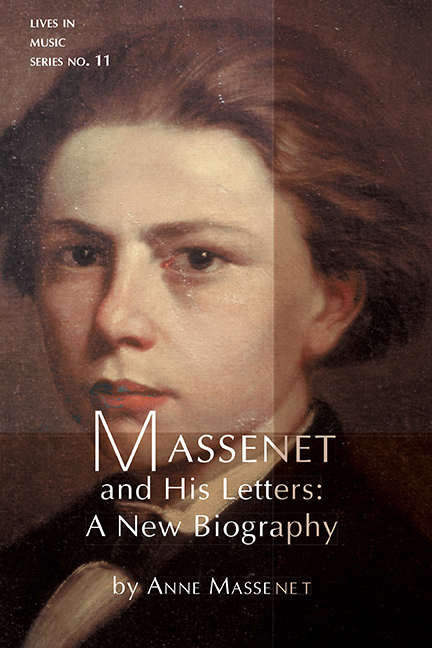Book contents
- Frontmatter
- Contents
- List of Illustrations
- Simplified Genealogy of the Massenet Family
- Foreword
- Dedication
- Translator's Preface
- I Years of Apprenticeship and Roman Adventure
- II The Steps of Quai Conti
- III Notebooks and Sketches
- IV Sybil Sanderson—“The Unique”
- V Massenet's Students
- VI Summer Solitude
- VII The Last Years—Posthumia
- VIII Conclusion
- Massenet: Biographical Chronology
- Bibliography
- About the Author
- Translator's Notes
- About the Translator
- General Index
- Index of Massenet's Works Cited
- Index of Letters Cited
Foreword
- Frontmatter
- Contents
- List of Illustrations
- Simplified Genealogy of the Massenet Family
- Foreword
- Dedication
- Translator's Preface
- I Years of Apprenticeship and Roman Adventure
- II The Steps of Quai Conti
- III Notebooks and Sketches
- IV Sybil Sanderson—“The Unique”
- V Massenet's Students
- VI Summer Solitude
- VII The Last Years—Posthumia
- VIII Conclusion
- Massenet: Biographical Chronology
- Bibliography
- About the Author
- Translator's Notes
- About the Translator
- General Index
- Index of Massenet's Works Cited
- Index of Letters Cited
Summary
The goal of this book is to reveal Massenet's authentic personality as found in previously unpublished family archives, letters, and photos that he carefully collected and that bear his autograph annotations.
This book, therefore, does not claim to be a scholarly or musicological document. Its purpose is to engage the reader, while providing a response to the wide-spread, perfidious insinuations and fanciful affirmations of which Massenet was, and remains, the victim for over a century.
I do not doubt that, eventually, others will follow my lead, continuing this portrait by recognizing both Massenet's musical oeuvreand his role as professor during his eighteen years at the Conservatoire, and then, as long as his health allowed it, with private instruction.
My personal goal was to attempt to reconstruct the underlying personality of an extremely reserved man. It was not an easy task, for he rarely revealed himself, except to those closest to him, and not always then.
This very timid, anxious man constantly looked for reassurance. Each letter to his family, or almost each, demonstrated his permanent state of anxiety, his fear that his Oeuvre(with a capital O) would not be appreciated by the public or the critics. Some have interpreted his ongoing inquietude as evidence of a difficult personality. Proof to the contrary is documented in Massenet's generous support of his students, who remained permanently grateful to him. With the passing years, they became famous composers or conductors—their relationship with this teacher continued until his death, and they cherished his memory.
In reality, this man, who was often criticized for what was mistakenly described as facile success, suffered intensely from each attack. And we must add that the critics did not spare him, especially from 1893 on, beginning with the Parisian premiere of Werther,which was to be a turning-point in Massenet's creative process.
Was their acrimony more than a coincidence? Should it be attributed to the tenacious rancor of a certain colleague, also recognized as an authoritative critic, who met with less success in the world of opera? Whatever the cause, we occasionally are confronted by opinionated detractors whose severe judgments are usually due to their ignorance.
- Type
- Chapter
- Information
- Massenet and His LettersA New Biography, pp. ix - xPublisher: Boydell & BrewerPrint publication year: 2015



